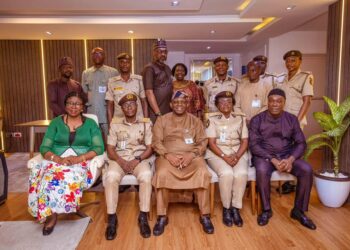The celebrated National Seafarers Development Programme (NSDP) of the Nigerian Maritime Administration and Safety Agency (NIMASA) has suffered yet another setback, following complaints and apprehension by graduating cadets about non-availability of space on board ocean-going vessels for the mandatory Seatime.
The celebrated National Seafarers Development Programme (NSDP) of the Nigerian Maritime Administration and Safety Agency (NIMASA) has suffered yet another setback, following complaints and apprehension by graduating cadets about non-availability of space on board ocean-going vessels for the mandatory Seatime.
Consequently about 17 students at the prestigious Liverpool John Moores University in the United Kingdom last week told a shocked Nigeria’s High Commissioner to the UK; Dr Dalhatu Tafida that they are at the risk of not qualifying for “Certificate of Competency'' in view of challenges that they rae facing about the securing Sea Time ion ships.
The leader of the students, Mr Hashimu Audi disclosed this during a courtesy visit to Nigeria's High Commissioner last week in London.
All the students are being sponsored under the NSDP by their respective state governments and the and NIMASA.
Under the training programme, 10,000 Nigerian students were targeted for maritime education, so far, only two batches made up of students from Benue, Ondo, Niger and Kaduna states have befitted from the scheme.
Audi, while appealing for support from the High Commission, said the students were yet to embark on the 12 months mandatory SeaTime which would enable them sit for the Certificate of Competency examination.
He said without the training it would be impossible for them to become seafarers or even teach Maritime education, bringing to futility their studies.
He alleged that NIMASA, as facilitator of the programme is yet to arrange for them to embark on the training, instead, got them return tickets back home.
Audi told the High Commissioner that the same faith befell students who were in the batch one of the programme “when they returned home, they were left stranded for many months”.
“Before we embarked on this programme, NIMASA is supposed to have written an agreement with a shipping company that will give us Sea Time training.
“Our university thought NIMASA had the capacity to facilitate such training for us, because as individuals we cannot apply for Nautical Science on our own, we need facilitation from NIMASA," Audi said.
The High Commissioner who pledged to intervene in the matter said the High Commission was not aware of the presence of the students in the institution and their attendance of the programme.
The Certificate of Competency would qualify the students as “Second Officer of the Watch'' and with that qualification, the students would be equipped for seafaring life.
Under the NSDP , Nigerian youths are encouraged to study Bsc Marine Engineering, Bsc Nautical Science and Bsc Naval Architecture.
When the programme started in 2008, it started with a vision to training at least 5,000 Nigerian seafarers by the year 2015 and increasing this figure to 50,000 by the year 2025
The programme was to be funded by both NIAMASA to the tune of 40% of total cost of training, while states whose indigenes are participating will provide 60% funding, a development that saw some states foot dragging thereby resulting in the low turn out candidates from the e participating states.
Shipping Position Daily recalls that during its last visit to NIMASA, the Senate Committee on Marine Transport had expressed worries over the inability of graduates of the programme to get the compulsory Sea Time training, noting that without the training these young Nigerians would be unemployable.
Speaking during the over-sight visit to the safety agency, the Chairperson of the Committee; Senator Zynab Kure disclosed that some of the cadets are idling away, waiting for any opportunity for such training that may never come.
Kure had urged NIMASA to collaborate with institutions that can give sea time training to this group of Nigerian so as not to defeat the objective of the entire project.
And buttressing the committee chair’s worries, a member of the committee; Senator Oluremi Tinubu, also said that some of the cadets she spoke with when the Committee visited the AMET University in India, expressed a similar fear of being excluded from the 18 months Sea Time training.
She harped on the importance of the cadets to be employed after their training adding that the country already has a problem of unemployment.
















Discussion about this post